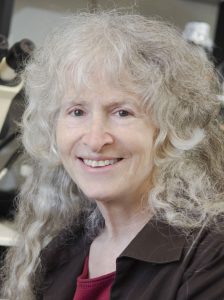 Ellen Rothenberg, Ph.D., is the Albert Billings Ruddock Professor of Biology at Caltech. She graduated from Harvard University and received her Ph.D. from the Massachusetts Institute of Technology. After a Jane Coffin Childs Postdoctoral Fellowship at the Memorial Sloan-Kettering Cancer Center, she took her first faculty position at the Salk Institute for Biological Studies, then joined the Caltech faculty in 1982. Her recent honors include the Richard P. Feynman Prize for Excellence in Teaching (2016), and election as Fellow of the American Association for the Advancement of Science (2017) and Fellow of the American Academy of Arts and Sciences (2018). She has organized multiple international conferences in immunology and systems developmental biology and has served on multiple editorial and scientific advisory boards. She studies gene regulation and development of T lymphocytes, gene networks controlling hematopoietic cell fates, and mechanisms underlying the dynamics of single-cell developmental decisions.
Ellen Rothenberg, Ph.D., is the Albert Billings Ruddock Professor of Biology at Caltech. She graduated from Harvard University and received her Ph.D. from the Massachusetts Institute of Technology. After a Jane Coffin Childs Postdoctoral Fellowship at the Memorial Sloan-Kettering Cancer Center, she took her first faculty position at the Salk Institute for Biological Studies, then joined the Caltech faculty in 1982. Her recent honors include the Richard P. Feynman Prize for Excellence in Teaching (2016), and election as Fellow of the American Association for the Advancement of Science (2017) and Fellow of the American Academy of Arts and Sciences (2018). She has organized multiple international conferences in immunology and systems developmental biology and has served on multiple editorial and scientific advisory boards. She studies gene regulation and development of T lymphocytes, gene networks controlling hematopoietic cell fates, and mechanisms underlying the dynamics of single-cell developmental decisions.
Solving Gene Regulatory Networks for Blood Cell Development with Fluorescent Reporters and Multiparameter Flow Cytometry
Abstract:
Blood cell fates are determined throughout life, as hematopoietic stem cells generate wave after wave of progeny that choose which of more than ten possible developmental pathways they will follow. The choices are actually dictated by the activities of groups of transcription factors, gene regulation proteins within the developing cells, working in different combinations and cross-influencing each other in gene regulatory networks. How can these complex mechanisms be understood? Flow cytometry turns out to be an extremely powerful probe. It not only reveals the exact stages that individual cells are in at any given moment, during their choices of different fates, but it also can be exploited by researchers to dissect the machinery that determines which choice the cell will make. This talk will examine the gene regulatory network that enables blood precursor cells to choose the path of becoming T cells. It will focus on the way fluorescent reporters for the activity of key genes in the cells can shed light on the control factors for this process, including details of the dynamic aspects of their activities. Data using dual fluorescent reporters together with multidimensional cell stage phenotyping shows that flow cytometry can even reveal underlying principles of epigenetic regulation of development.
